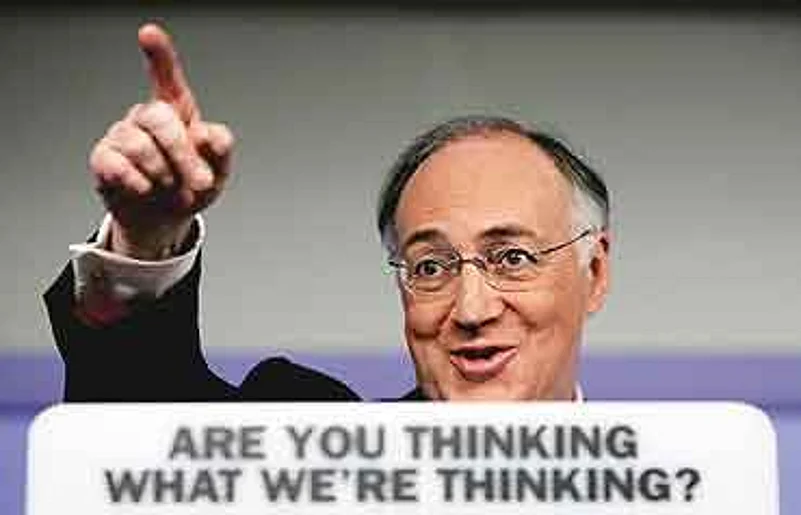The poster put up by the Conservative Party, like the immigration debate in Britain, stood in black and white. "I mean, how hard is it to keep a hospital clean?" said the words in black on one side of the poster. On the other side: "It's not racist to impose limits on immigration." At the bottom of the poster sat the question that has come to be the question of this election: "Are you thinking what we're thinking?"
The ruling Labour Party earlier put up a poster showing Conservative leader Michael Howard as a pig with wings, and another presenting him as Fagin, the character who trained pickpockets in Charles Dickens' Oliver Twist. Both posters were withdrawn after strong objections from Jewish groups. Jewish people shun pork, and Fagin was a Jewish character.
That poster war was only the more visible expression of rhetoric that turned immigration into an election issue becoming uglier by the day until the Commission for Racial Equality advised all parties to cool it. But immigration continues to hover over the campaign as Conservative, Labour and Liberal Democratic (a distant but still threatening third) leaders swing from one talking point to another. Between them, their bosses sound sometimes like three leaders in search of a cause. To election watchers, mornings begin with the question: what will they agree to disagree about today?
The debates have proceeded from immigration to do the rounds of health, taxation, crime, Iraq and education. One usually forgets by the next day which party stood for what. Iraq, of course, is different. The LibDem, the only party that consistently opposed the Iraq war, is going to town to say it was right all along. Town more than village because the villages are the Tory heartland that loves a Britain at war. The Tories dutifully backed the war, but Howard has attacked Blair over what he called lies about Iraq's illusory weapons of mass destruction. Blair is sticking to his guns.
LibDem leader Charles Kennedy has declared that the election will be a referendum over Iraq. That may not be good for his party. The Iraq war drew the biggest demonstrations ever seen in Britain, but opinion polls have shown majority support for the government. The Iraq-bashing by the opposition could unleash right-wing support for Blair over Iraq, as it did for Bush in the US.
"Iraq could be a factor in constituencies with a high Muslim or student population," Sunder Katwala, general secretary of the Fabian Society, a left-leaning think tank, told Outlook. It would be a particular factor in Bethnal Green constituency in London where expelled Labour member George Galloway who spoke out against the war has taken on the Labour candidate. It would also be an issue in Blackburn, the constituency of foreign secretary Jack Straw. Blackburn has a strong Muslim population but, says Katwala, "I'd be surprised if Straw is defeated on that issue."
No issue other than immigration has held up more than a couple of days, which might just mean that there really is no particular issue dominating the election. In the end, it could just be a matter of who looks more prime ministerial. A 'prime minister Michael Howard' does not seem to sound right, and few are predicting any such thing. In all polls Labour is ahead.

Howard might yet trip up himself on that one hook with which he has baited Blair longest. A newspaper claimed earlier this year that Howard's grandfather came into Britain as an illegal immigrant, after presenting falsified papers. A whisper campaign over that has persisted ever since, and Howard may yet see the consequences of his grandfather's doings.
Howard also managed to sound simply ignorant when he declared he will pull Britain out of its commitment to the Geneva Refugee Convention of 1951. "It will take an authoritarian regime to do that," Habib Rahman, chief executive of the independent Joint Council for the Welfare of Immigrants (JCWI), told Outlook. "It'll mean the government will have to derogate from its Human Rights Act which incorporates the European Convention on Human Rights."
Political leaders are making "irresponsible statements which inflame the race debate," he said. "The Tories say it is not a race issue but it is; the people affected will be those from developing countries or countries of strife; we are not talking about Australians and Canadians here."
In a country with a population of 58 million, the million or so Indian votes are strongly influential in at least 30 of the 646 seats. "Of all minority groups, Indians are more likely to vote Conservative than others, but the predominant vote is for Labour," says Kully Kaur-Ballagan from MORI (Market and Opinion Research International). Every party has 'friends of India' groups that have sought to network the Indian community assiduously, and who'd be surprised, messily.
The oldest of these groups is the Labour Friends of India (LFIN) run by an rss member in Britain who has been the official middleman for government relations with the British ruling party for several years. Concern has risen among members from other parties following indications that the Indian high commission has paid this group over half a million dollars over recent years. Despite denials by both this group and the high commission, few believe this representation has come gratis, inspired by love of the Labour Party on the one hand and of India on the other.
Former Tory MP Peter Luff, who quit earlier as head of the Conservative Friends of India, says "it would not be appropriate for the Indian high commission to offer financial support to any political party." While denying knowledge of such financial support for LFIN, Luff told Outlook that "a party is not allowed under British electoral law to receive money from a foreign government." Payments to a 'friends' group rather than to the party itself "could be a loophole, but it would be against the spirit of the law." He says he would "encourage the Conservative Party not to accept any money from the Indian high commission."
Members of the Liberal Democrat Friends of India have, however, approached the high commission for funding, according to party sources. One of these demands is for payment of £25,000 a year plus expenses. That is less than what is believed to be paid to LFIN, but these groups are looking also for other perks, not least the very comfortable junkets to India once or twice a year in the company of MPs.
These groups are expected primarily to lobby party MPs, but also to build up support for the parties among British Indians. The Conservative 'friends' have split up into the Conservative Friends of India and the British Asian Conservative Link. The LibDem group is waiting to see what the Indian high commission can do for it. Meanwhile, none of these groups has done much to swing the Indian vote towards the parties they are intended to represent.

























